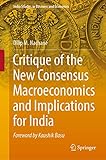Critique of the new consensus macroeconomics and implications for India
Material type: TextSeries: India studies in business and economiesPublication details: Springer 2018 New DelhiDescription: xxvii, 407 p. Includes bibliographical referencesISBN:
TextSeries: India studies in business and economiesPublication details: Springer 2018 New DelhiDescription: xxvii, 407 p. Includes bibliographical referencesISBN: - 9788132239185
- 332.4954 N2C7
| Item type | Current library | Collection | Call number | Status | Date due | Barcode | Item holds | |
|---|---|---|---|---|---|---|---|---|
 Book
Book
|
Ahmedabad General Stacks | Non-fiction | 332.4954 N2C7 (Browse shelf(Opens below)) | Available | 201172 |
Table of Contens
New Consensus Macroeconomics(NCM): Theory
NCM: Macroeconomic Policy Implications
NCM : Implications for Regulation
NCM : Role of Finance in Long-term Development
Anatomy of Global Crisis
Theoretical Critiques of the NCM
Macroeconomic Policy Consequences of the NCM Critiques
NCM Critiques : Regulatory Implications
India's Regulatory Response to the Crisis
Re-assessing the Role of Finance in the Economy
India's Roadmap for Future Development of Financial Sector.
The thought-provoking book presents alternative viewpoints to mainstream macroeconomic theory, questions conventional policy wisdom and suggests a systematic re-orientation of current macroeconomic and financial regulatory policies in India.
The New Consensus Macroeconomics (NCM), which established itself in the 1980s as mainstream macroeconomics, essentially represents an “uneasy truce” between two dominant schools of economic thought viz. New Classical and Neo-Keynesian economics. The NCM sets the tone for much of the macroeconomic (especially monetary) policy followed by the advanced economies in the period of the Great Moderation (1990–2005). The recent global crisis has posed a major challenge to the NCM as empirical models based on the NCM failed to anticipate the occurrence of the crisis and later its extent and severity.
The above considerations constitute the underpinnings of this book, which addresses the theoretical controversies within a general context and their policy implications for India. The authors’ analysis leads to a somewhat critical assessment of the financial sector policies followed in India since the initiation of reforms in 1991. This makes the book a valuable resource not only for researchers working in this area, but also for policy makers.
https://link.springer.com/book/10.1007/978-81-322-3920-8#about
There are no comments on this title.

